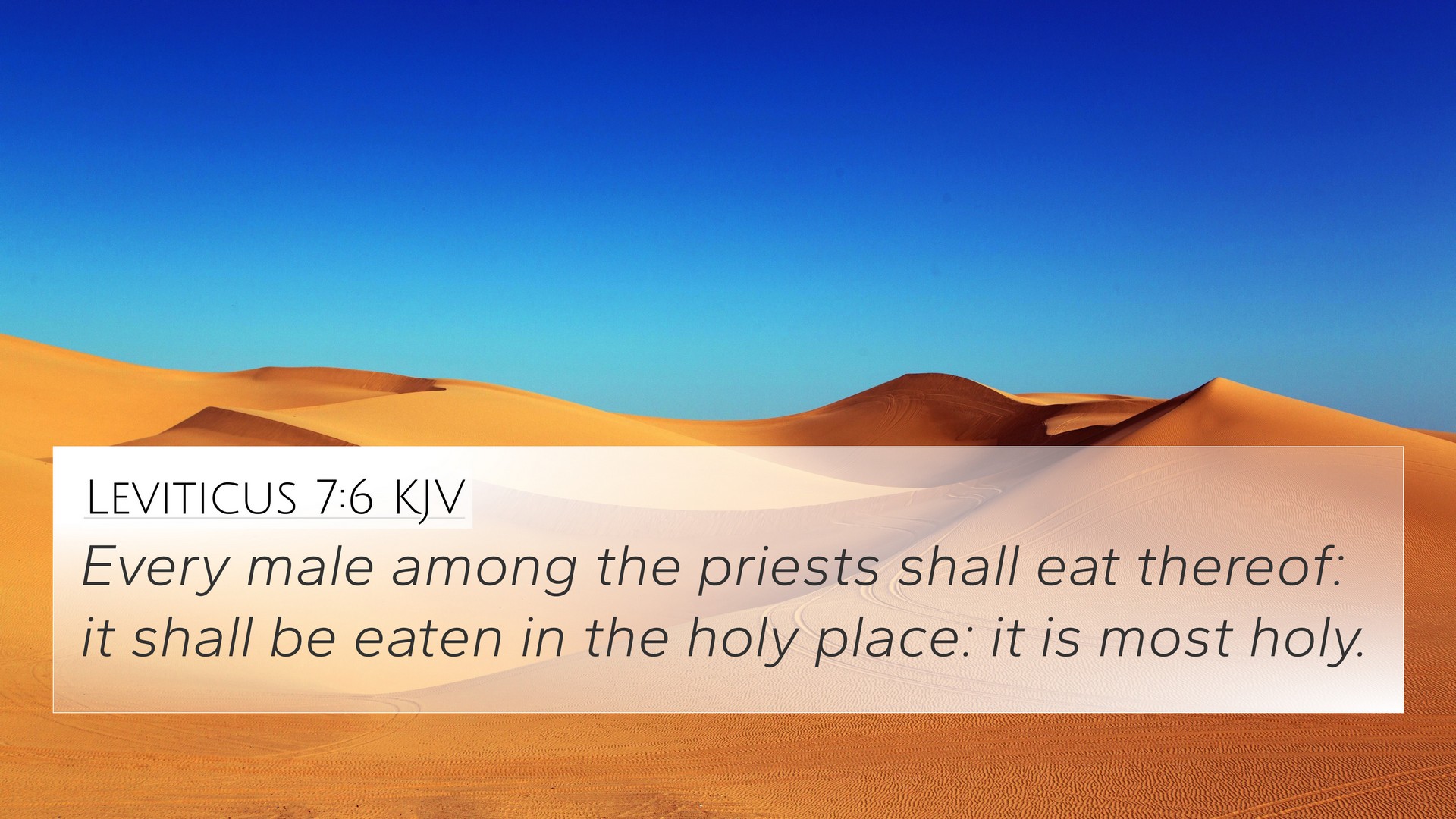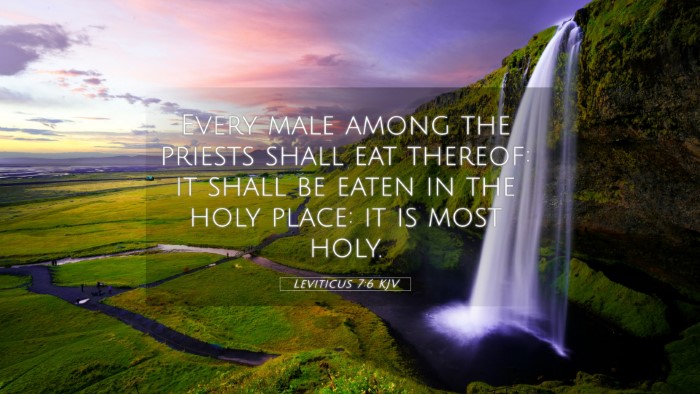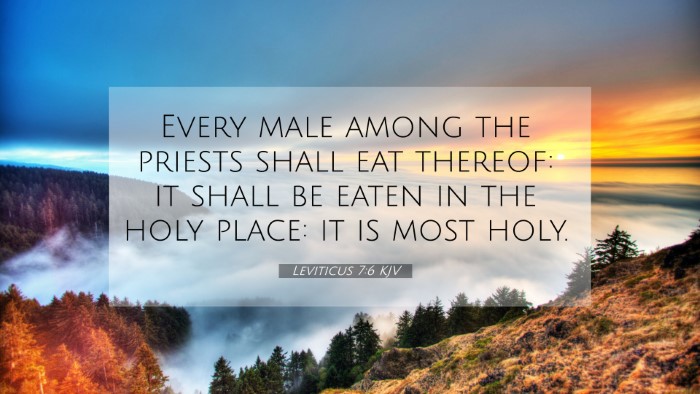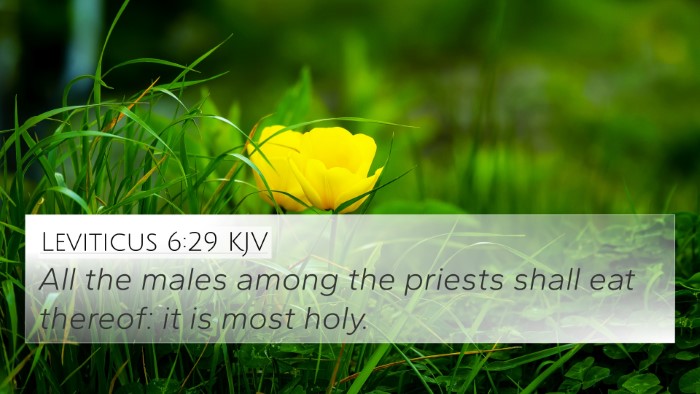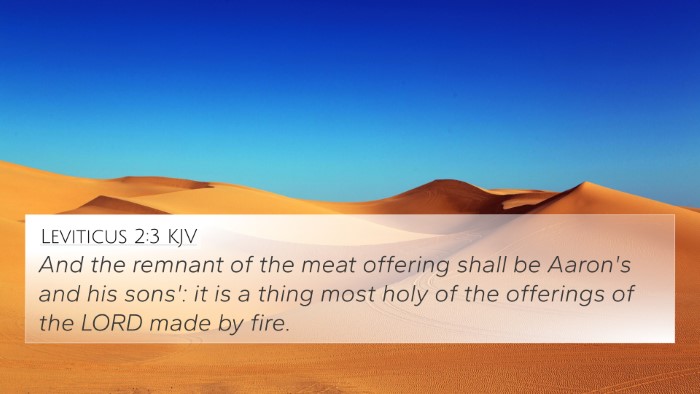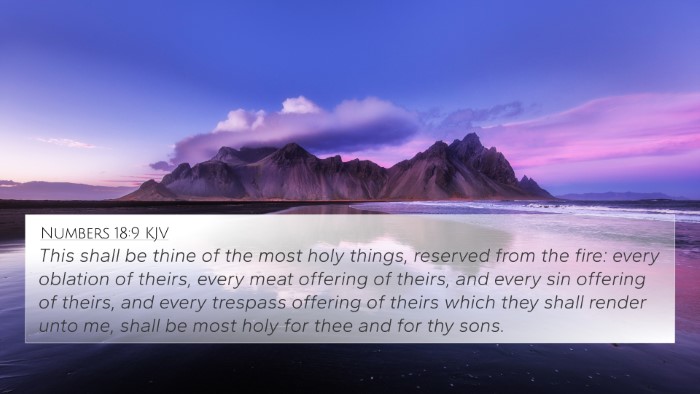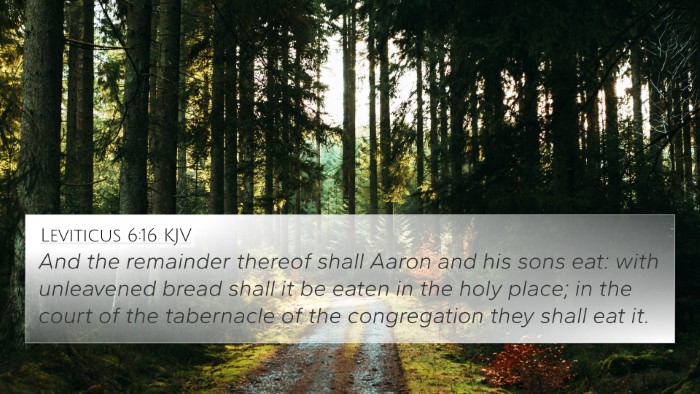Understanding Leviticus 7:6
Leviticus 7:6 states: "The flesh of the sacrifice of his peace offerings for thanksgiving shall be eaten the same day that it is offered; he shall not leave any of it until morning." This verse is significant as it outlines the guidelines for peace offerings, particularly those offered in gratitude, emphasizing the urgency and importance of consuming the offering promptly.
Commentary Summary
Matthew Henry's Commentary
Matthew Henry emphasizes that the peace offerings are an expression of thankfulness to God. He notes that these sacrifices are meant to foster communion with God. The idea that the offering should be consumed on the same day signifies the commitment of the worshipper to celebrate God's goodness without delay.
Albert Barnes' Commentary
Albert Barnes provides insights into the significance of the peace offerings. He explains that these offerings acknowledge God’s providence and blessings. The instruction to eat the offering within the same day indicates the necessity of immediate gratitude and the communal aspect of the sacrifice, as it allows for shared meals among the offeror and their family or community.
Adam Clarke's Commentary
Adam Clarke elaborates on the spiritual implications of consuming the peace offerings. He points out that the act of eating together symbolizes unity and joy in the presence of the Lord. He also highlights that using the same day for consumption reflects the urgency of expressing thanksgiving, encouraging believers to actively acknowledge God’s blessings continuously.
Significance of Quick Consumption
The requirement to consume the peace offering on the same day resonates with a broader biblical theme of immediate response to God’s goodness. This act of quick consumption served both practical and symbolic purposes:
- Symbol of Gratitude: Eating the offering promptly reflects the worshipper's immediate acknowledgment of God's blessings.
- Community Bonding: Sharing the meal emphasizes the importance of fellowship within the community as they collectively honor God.
- Respect for Sacred Offerings: It demonstrates a reverence for the sacrifices made to God, ensuring nothing is wasted.
Cross-References to Leviticus 7:6
This verse connects with various other biblical texts, highlighting the theme of offerings and the importance of thankfulness. Here are some significant cross-references:
- Leviticus 3:1-5: Details the procedures for peace offerings.
- Leviticus 22:29: Discusses the offering of sacrifices and expresses gratitude.
- Psalm 107:22: Encourages the offering of sacrifices of thanksgiving.
- 1 Corinthians 10:16: Links sharing in the sacrifice of Christ with the communion aspect of eating together.
- Colossians 3:17: Encourages doing everything in the name of Jesus, encompassing the spirit of thankfulness.
- Hebrews 13:15: Instructs believers to continually offer a sacrifice of praise.
- Exodus 24:5: Refers to offering peace offerings as part of covenant renewal ceremonies.
- Deuteronomy 12:6: Describes how offerings are to be brought to the place chosen by God.
- Psalm 50:14: Declares the importance of offering thank offerings to God.
- Matthew 5:23-24: Teaches about reconciling with others before offering gifts to God.
Thematic Connections
This examination of Leviticus 7:6 can serve as a template for deeper scriptural connections. The themes of gratitude, community, and worship appear throughout the Bible, especially in relation to offerings:
- Thanksgiving: Many verses throughout the Psalms, such as Psalm 95:2, emphasize the need for thanksgiving in worship.
- Fellowship Offerings: Enhancements in understanding through references in New Testament, such as Acts 2:46-47, highlighting shared meals among believers.
- Immediate Response: The biblical emphasis on being quick to respond to God's goodness can be seen in several parables, urging believers to act immediately in faith.
Scriptural Cross-Referencing
To facilitate deeper understanding of this verse, engaging in cross-referencing can lead to enriched Biblical insights:
- Tools for Bible Cross-Referencing: Utilizing bible concordances and reference guides can illuminate the connections among scripture.
- Comprehensive Bible Cross-Reference Materials: Studying thematic links enhances understanding of Biblical texts and teachings.
- How to Find Cross-References in the Bible: Readers should explore various translations and glossaries for context and connections.
Conclusion
In conclusion, Leviticus 7:6 serves as a rich verse embodying themes of gratitude and community in sacrificial practice. Its connections to other scriptures reveal a cohesive narrative about worship and thanksgiving that spans both the Old and New Testaments. Engaging with this verse through comparative analysis and inter-Biblical dialogue can deepen spiritual insight and foster a more profound understanding of the importance of offerings in our relationship with God.
